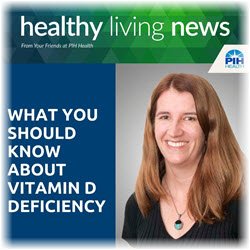What You Should Know About Vitamin D Deficiency
 Have you ever wondered, “How’s my vitamin D today?” Chances are, you probably have not. However, it is important to know your vitamin D levels to help maintain good health as you grow older.
Have you ever wondered, “How’s my vitamin D today?” Chances are, you probably have not. However, it is important to know your vitamin D levels to help maintain good health as you grow older.
In adults, vitamin D deficiency can lead to loss of bone density (becoming too thin) which can contribute to osteoporosis and fractures. It’s important to know whether or not you’re deficient so your doctor can advise you on how to increase levels of vitamin D, if it’s needed.
Some signs and symptoms of vitamin D deficiency include:
- Excessive sweating
- High blood pressure
- Overweight
- Mood swings
- Fatigue
- Anxiety
- Depression
- Frequent infections
- Slow healing of skin wounds
- Digestive problems
- Dry skin
- Joint pain
There are a few ways we intake vitamin D:
- Food (what we eat)
- Sunlight (how much time we spend outdoors)
- Supplements (may help provide what our bodies are lacking)
According to Elisabeth Brown MD, Family Medicine Physician at PIH Health, “Vitamin D consumed through diet is often less than what is recommended. Sunlight exposure can help make up the difference, but even still, that’s not enough to keep bones healthy,” she says. “If we factor in the use of so much sunscreen these days, our vitamin D intake is even less than what it should be.”
Dr. Brown recommends that all patients talk to their doctor about whether or not they should take a vitamin D supplement. “It is important to not take too much vitamin D as it is a fat soluble and can be harmful in excess,” she says. To help increase vitamin D levels, try incorporating these foods into your daily diet:
- Fatty fish (i.e.: tuna, mackerel or salmon)
- Dairy (cheese, yogurt, etc.)
- Eggs
- Fortified foods (certain dairy products, orange juice, soy milk, etc.)
“A little bit of sunshine a day will also help,” says Dr. Brown.
If you have questions about your vitamin D intake or overall health, schedule an appointment with your primary doctor. To find a PIH Health primary care doctor, visit PIHHealth.org/Find-a-Doctor.